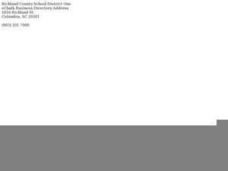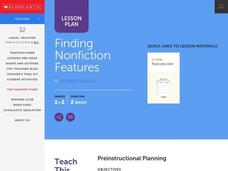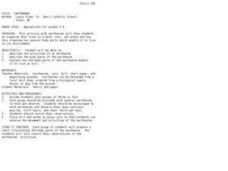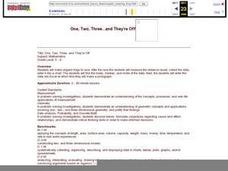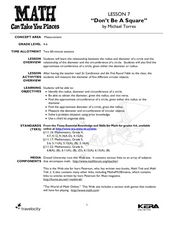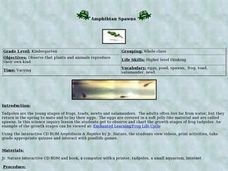Curated OER
Patterns
Fourth graders investigate patterns and sequences. In this patterns and sequences lesson, 4th graders use a hundreds chart to build recurring patterns. Students skip count by threes and fives on a hundreds chart by coloring multiples...
Curated OER
Team Problem-Solving Fun
Young scholars work in groups to solve a variety of puzzling activities which include math, spelling, anagrams, and geography. They use cooperative skill to accomplish each task and chart their group progress.
Curated OER
Music Favorites and Place Value
Fourth graders view CD ads and create a chart about an imaginary CD purchase. In this CD lesson, 4th graders calculate various cost connected with the CD's at the regular price and on sale. Students write a paragraph about the person...
Curated OER
Finding Nonfiction Features
Young scholars review the differences between a fiction and non-fiction book. In groups, they use different non-fiction books to identify the eleven features that distinguish it from a fiction book. To end the lesson, they create a...
Curated OER
Let's Take Care of Our Teeth!
Students identify types of teeth, tools for teeth, the people and behaviors associated with dental care. Then, they create a list of ways to take care of their teeth. Students also create a chart of dental care using key terms and...
Curated OER
Spring is Here
Learners analyze changes between winter and spring. In this seasonal changes lesson plan, students read the story "Spring is Here." They record changes between winter and spring on a large chart paper. Learners compare and contrast the...
Curated OER
Earthworms
Students observe and chart the body of earthworms. In this earthworm lesson plan, students each get their own earthworm to observe and play with. They then record the different body parts of an earthworm and the different behaviors they...
Curated OER
Punctuation Review/Tic-tac-toe
Sixth graders play a tic-tac-toe game in pairs. In this language arts lesson, one student uses an X to show the correct sentences, while the other student uses an O to show incorrect sentences. Students use a T-chart to record the...
Curated OER
Needs and Wants
First graders recognize the difference between needs and wants. In this treaty instructional activity, 1st graders chart their needs and wants to be used in making a treaty. Students negotiate what should be in the treaty based on the...
Curated OER
My Side of the Mountain
Learners complete activities with the book My Side of the Mountain by Jean Craighead George. In this literature lesson, students read the book and discuss the concept of human capital. They complete a KWLH chart and two assessments.
Curated OER
One, Two, Three...and They're Off
Students make origami frogs to race. After the race they measure the distance raced, collect the data, enter it into a chart. They then find the mean, median, and mode of the data. Next, students enter this data into Excel at which time...
Curated OER
Insulators and Conductors
Fourth graders experiment to discover which items are conductors and which items are insulators. In this insulators and conductors instructional activity, 4th graders experiment and create a T-Chart. Students are assessed on the...
Curated OER
Exploring The Depths!
Fifth graders make a model of the ocean floor. For this ocean characteristics lesson, 5th graders complete a KWL chart about the ocean floor, use the Ocean Depth Data Sheet to create a graph, and create a 3-D model of the ocean floor.
Curated OER
The Gingerbread Man
First graders read a story from sentence strips and charts. Student pairs are called on to read their answer and move that strip to the top of the chart. One line of students moves down, giving each student a new partner. The activity...
Curated OER
FROG
Studdents are able to identify the metamorphosis of a frog from tadpole to frog. They are able to communicate through writing what they learned about frogs. Students are able to compare what they included in the KWL chart.
Curated OER
What is Weather?
Students identify different types of weather and explore the weather for each season of the year. They complete a class seasonal weather chart, listen to the book "Oh Say Can You Say What's the Weather Today?," and create a magazine...
Curated OER
Don't Be a Square
Students analyze the relationship between radius and diameter. Students read Sir Cumference and the First Round Table then take measurements of circular items from around the room. Students compute the radius, diameter and...
Curated OER
Time Management: Piece of Pie
Students examine their own lives and how well they manage their time outside of school. In this this time management lesson, students discover the amount of time they spend on other activities, and create a pie chart with that...
Curated OER
Amphibian Spawns
Students observe tadpoles as they gradually change into adults. For this amphibian biology lesson, students watch tadpoles in a tank in the classroom, keep a daily record of what they observe, and chart the growth development of the...
Curated OER
Mayor Puts City on Diet to Lose a Million Pounds
Students read a story called Mayor Puts City on Diet to Lose a Million Pounds and answer vocabulary and comprehension questions about it. In this current event Lose a Million Pounds lesson plan, students respond to literature by...
Curated OER
School Life Today and in the Past at Freyberger School
Students compare and contrast school life today with that of Pennsylvania in the 1900's. In this school life lesson plan students create a description of a typical one-room schoolhouse. They think critically about attending school in a...
Curated OER
Stuck On You
Fifth graders, after completing a K-W-L-H Chart on electricity, discuss and illustrate the four ways lightening can move.
Curated OER
Government Lesson Plan: Lesson Plan 12
Learners investigate various political systems around the world. They complete a chart that compares the U.S. political system with other nations' governments, conduct research on a selected nation, and present an oral report.
Curated OER
Ladybugs
Third graders keep and report records of investigations and observations of ladybugs utilizing tools like journals, charts, graphs and computers. They discover and study the life cycle of ladybugs and complete a KWL chart about ladybugs.




